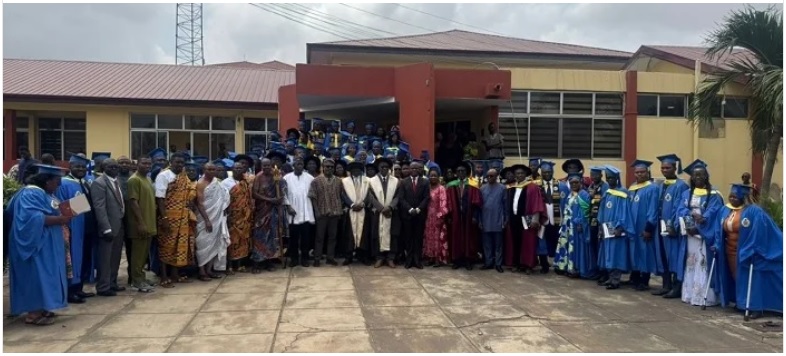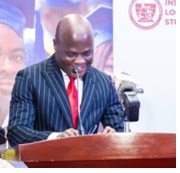 30th August, 2025: The Minister for Local Government, Chieftaincy and Religious Affairs, Hon. Ahmed Ibrahim has reiterated the commitment of the Government of His Excellency President John Dramani Mahama for the transformation of the Institute of Local Government Studies (ILGS) into a full-fledged public specialised degree-awarding institution. The law when passed will establish the new University of Local Governance and Development (ULGD), whose mandate shall be of strategic national importance for local governance, pursuant to article 240(2)(b) of the 1992 Constitution.
30th August, 2025: The Minister for Local Government, Chieftaincy and Religious Affairs, Hon. Ahmed Ibrahim has reiterated the commitment of the Government of His Excellency President John Dramani Mahama for the transformation of the Institute of Local Government Studies (ILGS) into a full-fledged public specialised degree-awarding institution. The law when passed will establish the new University of Local Governance and Development (ULGD), whose mandate shall be of strategic national importance for local governance, pursuant to article 240(2)(b) of the 1992 Constitution.
The sector Minister made this known at the 7th Congregation held at the Institute of Local Government Studies, Ogbojo-Accra. A total of one hundred and forty students graduated with various Master’s degree certificates, which included the MA Local Government Administration and Organisation; MSc. Public Financial Management; MSc. Development Management; MSc. Environmental Science, Policy and Management; and the MSc. Local Economic Development.
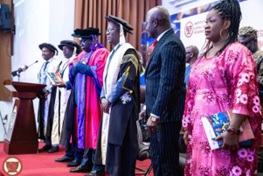 In his keynote address as the Special Guest of Honour, Hon. Ahmed Ibrahim applauded the ILGS Council, Management and staff for their hard work and dedication in ensuring the ILGS lived up to expectations. He said, the Institute continues to remain relevant and plays a critical role in strengthening Ghana’s decentralisation agenda through its research and other specialised training programmes for local government functionaries and staff. He noted that the establishment of the new ULGD would ensure the fulfilment of the dictates of article 240(2)(b) of the 1992 Constitution that envisaged the provision of adequate capacity of local government authorities to plan, initiate, co-ordinate, manage and execute policies in respect of all matters affecting the people within their areas of jurisdiction.
In his keynote address as the Special Guest of Honour, Hon. Ahmed Ibrahim applauded the ILGS Council, Management and staff for their hard work and dedication in ensuring the ILGS lived up to expectations. He said, the Institute continues to remain relevant and plays a critical role in strengthening Ghana’s decentralisation agenda through its research and other specialised training programmes for local government functionaries and staff. He noted that the establishment of the new ULGD would ensure the fulfilment of the dictates of article 240(2)(b) of the 1992 Constitution that envisaged the provision of adequate capacity of local government authorities to plan, initiate, co-ordinate, manage and execute policies in respect of all matters affecting the people within their areas of jurisdiction.
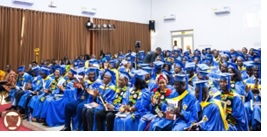 To this end, the ULGD would ensure that the requisite human resource capacities are adequate in terms of resourceful political functionaries to formulate policies and make developmental decisions; competent technical and administrative staff to implement the decisions of the DAs; and active citizens to engage and demand responsive governance, to ensure accountable delivery of basic services. He therefore urged the Council and Management to continue to work effectively towards creating a more congenial environment for academic work and also introduce more creative and innovative programmes that would help bridge the capacity gaps in the local governance sector, in particular and national development as a whole.
To this end, the ULGD would ensure that the requisite human resource capacities are adequate in terms of resourceful political functionaries to formulate policies and make developmental decisions; competent technical and administrative staff to implement the decisions of the DAs; and active citizens to engage and demand responsive governance, to ensure accountable delivery of basic services. He therefore urged the Council and Management to continue to work effectively towards creating a more congenial environment for academic work and also introduce more creative and innovative programmes that would help bridge the capacity gaps in the local governance sector, in particular and national development as a whole.
Hon. Ibrahim noted that frantic efforts was being made to ensure the smooth transitioning of the ILGS into the full-fledged university. “Let me assure you that the University of Local Governance Development Bill, 2025 will soon be presented to Parliament after the necessary cabinet consideration and approvals have been sought for its promulgation into law”, he stated. He entreated the graduands not to relent in their efforts to uphold the Institute’s core values of integrity, leadership and service excellence and also ensure knowledge and skills obtained are applied to transform the local governance system of the country.
In his presentation, the Director of the Institute of Local Government Studies (ILGS), Prof. Nicholas Awortwi, stated that the Institute was able to achieve more than 80% of its planned target under its 2020-2024 strategic plan. Amongst these included; increment in programme offerings; increased enrolment; reduction in the duration of most of the Master’s degree programmes from two to one year; as well as the development of several customized professional certificate training programmes for functionaries and staff of local governments.
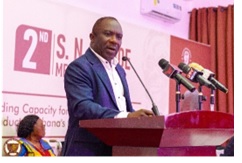 Prof Awortwi announced that the institute is collaborating with international training institutions to jointly deliver academic, research and students’ exchange programmes. He disclosed that 5 best students of the graduating class of 2025 have been selected to embark on an exchange programme at the Study Institute of Essen, in Germany. He further noted that discussions on the modality of a joint PhD programme with the Institute of Social Studies of Erasmus University in the Netherlands have been completed to enable successful applicants to pursue their PhDs both in Accra and the Netherlands in a flexible arrangement.
Prof Awortwi announced that the institute is collaborating with international training institutions to jointly deliver academic, research and students’ exchange programmes. He disclosed that 5 best students of the graduating class of 2025 have been selected to embark on an exchange programme at the Study Institute of Essen, in Germany. He further noted that discussions on the modality of a joint PhD programme with the Institute of Social Studies of Erasmus University in the Netherlands have been completed to enable successful applicants to pursue their PhDs both in Accra and the Netherlands in a flexible arrangement.
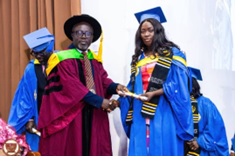 He further revealed that the Institute was on course for the establishment of a Centre of Excellence to offer customized certificate courses to chiefs and traditional authorities to equip them with the requisite knowledge in contemporary local governance in line with the expectation of citizens, the national Constitution and the changing modalities for promoting local level development. To be named, the Royal Academy of Chiefs and Traditional Authorities (RACTA), the Centre is expected to promote a culture that would ensure chiefs, …are able to work with MMDAs in a more coherent, harmonious, and sustainable ways.
He further revealed that the Institute was on course for the establishment of a Centre of Excellence to offer customized certificate courses to chiefs and traditional authorities to equip them with the requisite knowledge in contemporary local governance in line with the expectation of citizens, the national Constitution and the changing modalities for promoting local level development. To be named, the Royal Academy of Chiefs and Traditional Authorities (RACTA), the Centre is expected to promote a culture that would ensure chiefs, …are able to work with MMDAs in a more coherent, harmonious, and sustainable ways.
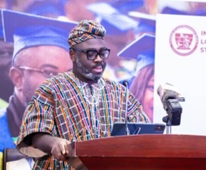 Delivering a paper as the Special Guest Speaker on the theme for the event, “Beyond the Fund Transfer: Exploring the Prerequisites for Improved Financial Accountability and Local Development in Ghana”, the Head of the Office of the Local Government Service, Professor Lord Mensah, underscored the importance of ensuring an enhanced financial accountability at the local level. He said, improved financial accountability at that level, helps to build a stronger, resilient and inclusive communities, capable of driving and sustaining their own development and also position them as strategic partners in drawing more investments towards the acceleration of the socio-economic potential of their jurisdiction.
Delivering a paper as the Special Guest Speaker on the theme for the event, “Beyond the Fund Transfer: Exploring the Prerequisites for Improved Financial Accountability and Local Development in Ghana”, the Head of the Office of the Local Government Service, Professor Lord Mensah, underscored the importance of ensuring an enhanced financial accountability at the local level. He said, improved financial accountability at that level, helps to build a stronger, resilient and inclusive communities, capable of driving and sustaining their own development and also position them as strategic partners in drawing more investments towards the acceleration of the socio-economic potential of their jurisdiction.
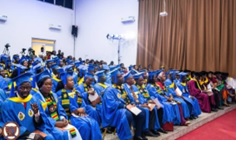 The Congregation was constituted by the Chairman of the ILGS Council, Dr. William Ahadzie and moderated by the Institute’s Registrar, Mr. David Osei-Wusu. In attendance were the Members of the Institute’s Governing Council, faculty, very distinguished guests who are key institutional stakeholders as well as friends and family of the graduands.
The Congregation was constituted by the Chairman of the ILGS Council, Dr. William Ahadzie and moderated by the Institute’s Registrar, Mr. David Osei-Wusu. In attendance were the Members of the Institute’s Governing Council, faculty, very distinguished guests who are key institutional stakeholders as well as friends and family of the graduands.


